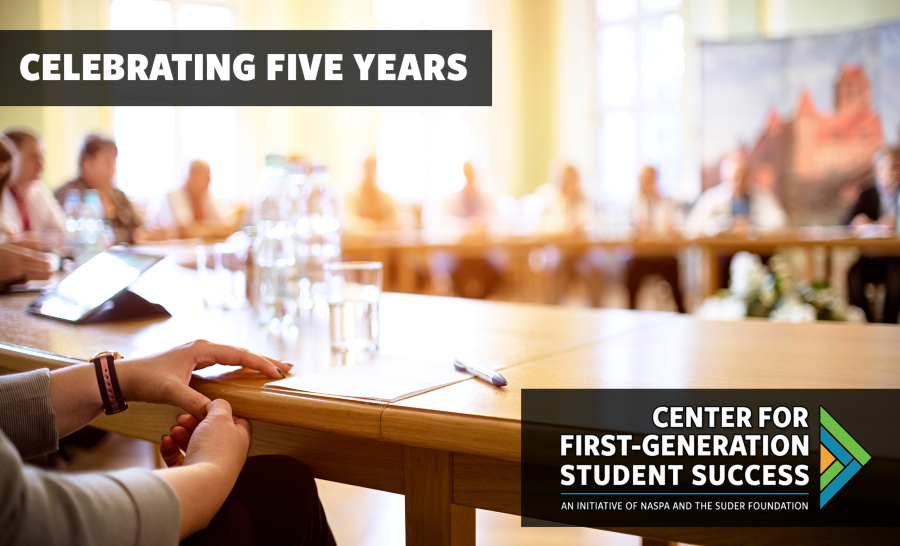Three Ideas for Post-Coronavirus Educational Recovery
There are many ways that schools can proactively address the inevitable and inequitable gaps caused by coronavirus-related school closures.
FirstGen Forward / June 07, 2022

The Center’s fifth anniversary provides a timely opportunity to reflect on how we’ve contributed to advocating on behalf of first-generation students. With thought leadership and advocacy as one of the Center’s strategic priority areas, our goal is to advance critical first-generation student success conversations, in part, through advocacy efforts.
In alignment with the NASPA Public Policy Agenda, the Center organizes its advocacy and policy work in three ways: raising awareness, engaging with public officials, and building partnerships. Since its inception, the Center made inroads in each of these areas to better serve the interests of first-generation students. Current advocacy efforts use a combination of the three approaches.
Launched in October 2020, the Center’s #AdvocateFirstgen social media campaign continues to be a vehicle for raising awareness about issues affecting first-generation students and offers ideas for engagement and action.
identify public officials who are first-generation graduates;
encourage additional funds for emergency aid that benefit first-generation students;
reach out to the Department of Education to oppose reinstatement of pre-COVID FAFSA verification requirements;
celebrate their local community colleges during #CommunityCollege month;
contact their representatives to discuss funding for mental health needs for first-generation college students;
support expanding broadband access for first-generation students; and
keep themselves apprised of state-level legislation concerning legacy admissions and college student mental health-related funding.
In concert with national partners in the Today’s Students Coalition, the Center signed on to a number of letters to members of Congress and the Department of Education on multiple issues affecting first-generation college students. These efforts include supporting increased mental health funding for institutions of higher education to use for student services, providing funding to increase public transportation for college students, requesting funding for emergency aid, and increasing resources for student parents. Through participation in the Double Pell Alliance, we’ve joined a national coalition of partners advocating to double the annual maximum amount of federal Pell Grants to $13,000.
Launched in October 2020, the Center’s #AdvocateFirstgen social media campaign continues to be a vehicle for raising awareness about issues affecting first-generation students and offers ideas for engagement and action.
Since 2017, the Center and the Council for Opportunity in Education (COE) have sponsored the National First-Generation College Celebration on November 8 to honor the signing of the Higher Education Act of 1965. Through this partnership, the Center and COE co-sponsor an annual national event. Past panel presentations featured first-generation professionals and TRIO alumni discussing the origin of the term “first-generation” and another group sharing their post-college career experiences. In November 2021, a bipartisan team of senators led by Senator Reverend Raphael Warnock (D-GA) and Senator Roger Marshall (R-KS) helped steer S. Res. 437 to passage under unanimous consent–helping to solidify the importance of November 8 as a day to recognize the contributions and accomplishments of first-generation college students.
As the Center looks forward, policy issues affecting first-generation college students remain prolific. Student loan debt relief is garnering the most attention currently. The administration initially announced an extension of the existing pause on collection of student loan payments and interest through August 31, 2022. Since that time, the Biden administration continues to indicate support for student loan debt relief for low-income borrowers up to $10,000, despite some calls for debt relief up to $50,000. With the August deadline looming, this issue will continue to remain at the forefront over the next few months.
Other policy areas for future consideration include joining partners in legislative strategies to advocate for emergency aid funds and monitoring state-level efforts on issues affecting various intersectional identities of first-generation students. Stay tuned as we continue to identify additional opportunities to #AdvocateFirstgen.
What strategies have helped you to champion first-generation students successfully? Share your perspective on first-generation student advocacy and pertinent policy issues across social media with #AdvocateFirstgen.